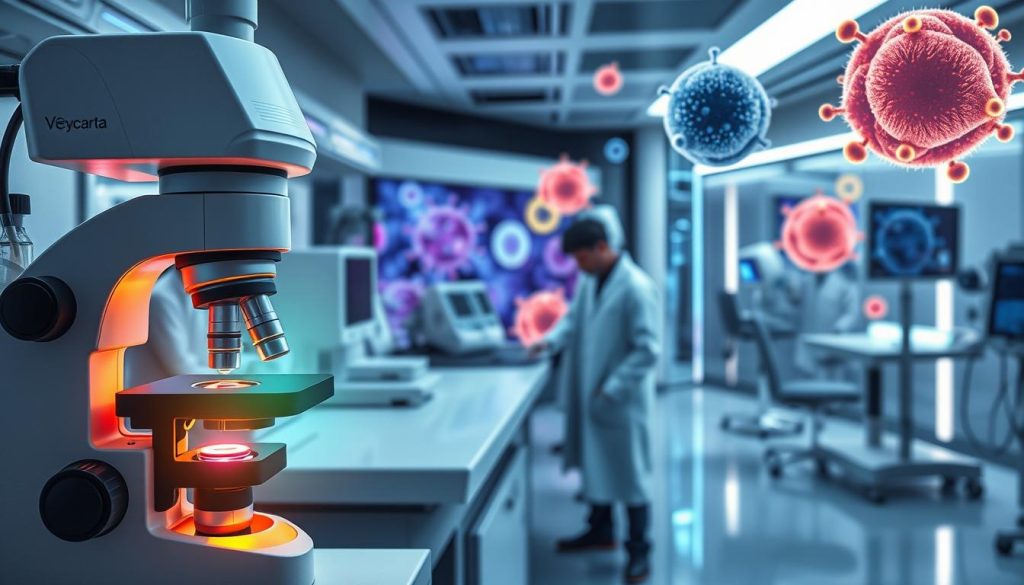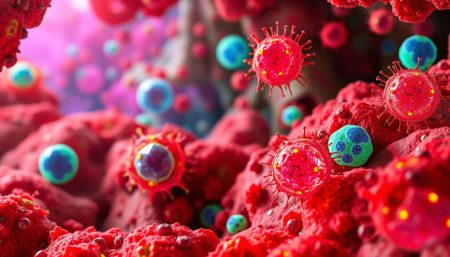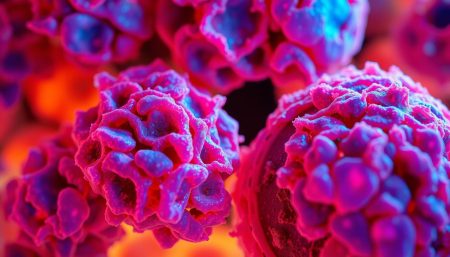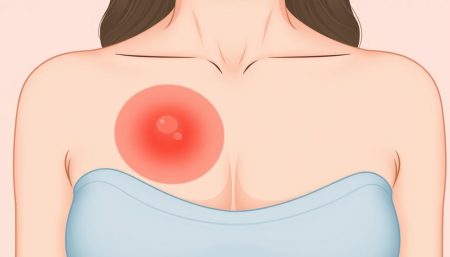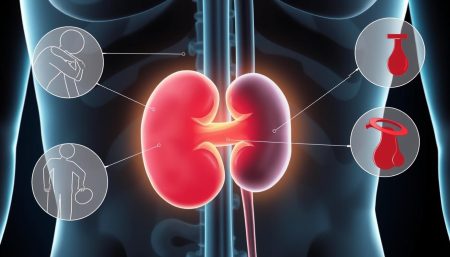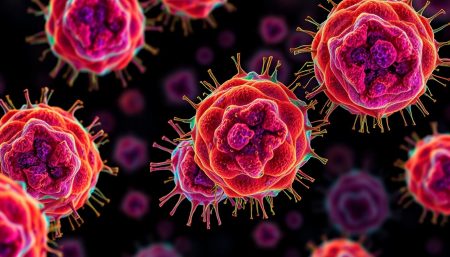In the world of cancer treatment, car t cell therapy Yescarta is a new way to fight blood cancers. Yescarta, or axicabtagene ciloleucel, uses the body’s immune system to attack cancer. It’s a type of immunotherapy.
This treatment changes a patient’s T cells to find and destroy cancer cells. T cells are a kind of white blood cell. Yescarta makes these cells attack cancer cells with a specific target.
The treatment starts with taking a patient’s T cells. This is done through a process called leukapheresis. Then, these cells are modified in a lab. They get a special tool to find and kill cancer cells.
What is Yescarta CAR T Cell Therapy?
Yescarta is a new way to fight certain types of non-Hodgkin lymphoma. It uses the body’s immune system to attack cancer cells. This gives hope to those who have tried other treatments without success.
Understanding CAR T Cell Therapy
CAR T cell therapy changes a patient’s T cells to fight cancer. T cells are a kind of white blood cell. They are made to find and destroy cancer cells.
To make Yescarta, T cells are first taken from the patient. Then, they are changed in a lab to find cancer cells. After that, they are grown and put back into the patient to fight cancer.
How Yescarta Works
Yescarta targets CD19, a protein on B-cell lymphomas. It uses the patient’s T cells to find and kill these cancer cells. This way, it can get rid of cancer without harming healthy cells.
Studies have shown Yescarta works well. Many patients have seen their tumors shrink a lot. Some have even stayed cancer-free for a long time. Here are the results from a key study:
| Response | Percentage of Patients |
|---|---|
| Overall Response Rate | 72% |
| Complete Response | 51% |
| Partial Response | 21% |
These results are very promising. They show Yescarta could be a big help for those with hard-to-treat lymphoma. As more research is done, we hope CAR T cell therapy will change how we fight cancer.
The Development of Yescarta
The story of Yescarta is a journey from lab to FDA-approved cancer treatment. It shows the hard work and creativity of Kite Pharma‘s scientists. This CAR T cell therapy has changed the game for some non-Hodgkin lymphoma patients, giving them new hope.
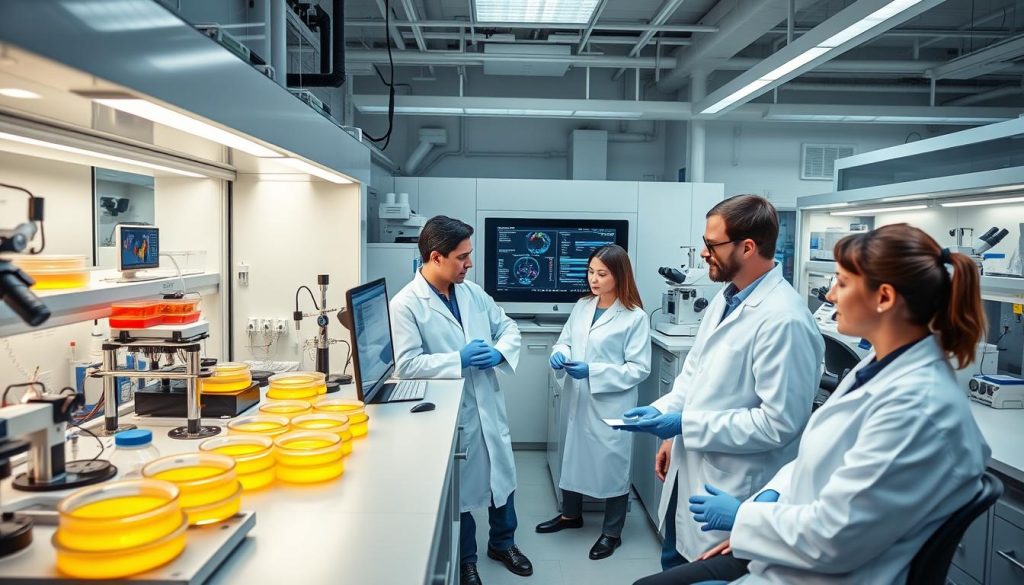
Kite Pharma’s Role in Yescarta’s Creation
Kite Pharma, based in Santa Monica, California, led the way in making Yescarta. Their team worked hard to use the body’s immune system to fight cancer. They made T cells attack and kill cancer cells, creating a therapy that works well in trials.
Clinical Trials and FDA Approval
The path to FDA approval for Yescarta was filled with strict clinical trials. These trials proved Yescarta’s safety and effectiveness. The ZUMA-1 trial, for example, showed great results:
| Response Rate | Percentage of Patients |
|---|---|
| Overall response rate | 82% |
| Complete response rate | 54% |
These results led to Yescarta’s FDA approval in October 2017. It’s for adults with relapsed or refractory large B-cell lymphoma after two or more therapies. This was a big step forward in cancer treatment, bringing hope to many.
“The FDA approval of Yescarta is a landmark for patients with relapsed or refractory large B-cell lymphoma. This approval would not have been possible without the courageous commitment of patients and clinicians, as well as the ongoing dedication of Kite, a Gilead Company, employees,” said Arie Belldegrun, MD, FACS, Founder of Kite.
Yescarta and other CAR T cell therapies have huge possibilities. They could treat many cancers in the future. The work of Kite Pharma and Yescarta’s success inspire the fight against cancer and the search for new treatments.
Indications for Yescarta Treatment
Yescarta is a groundbreaking CAR T cell therapy. It has been approved for specific blood cancers. This treatment is a hope for patients who have tried other options.
It works best for certain non-Hodgkin lymphoma types. These cancers start in the lymphatic system.
Non-Hodgkin Lymphoma
Non-Hodgkin lymphoma is a group of cancers in the white blood cells called lymphocytes. These cancers can be in different parts of the lymphatic system. Yescarta is very effective for aggressive non-Hodgkin lymphoma types, like diffuse large B-cell lymphoma (DLBCL).
Diffuse Large B-Cell Lymphoma (DLBCL)
DLBCL is the most common non-Hodgkin lymphoma, making up 30-40% of cases. It affects B lymphocytes, causing them to grow too much. Symptoms include big lymph nodes, fever, night sweats, and weight loss.
Traditional treatments include chemotherapy, radiation, and targeted therapy. But, some patients don’t respond well or relapse. Yescarta offers a new, effective option for these patients.
Relapsed or Refractory DLBCL
Relapsed DLBCL comes back after initial treatment. Refractory DLBCL doesn’t respond to first-line therapy or gets worse. These patients need different treatments.
Yescarta has shown great success in treating these cases. Clinical trials have shown impressive results:
| Clinical Trial | Overall Response Rate | Complete Response Rate |
|---|---|---|
| ZUMA-1 | 82% | 54% |
| ZUMA-7 | 83% | 65% |
These results show Yescarta’s power in treating relapsed/refractory DLBCL. It uses the patient’s immune system to fight cancer. This is a targeted, personalized approach.
Yescarta is a big step forward in treating relapsed or refractory large B-cell lymphoma. It gives patients a new option and hope in their fight against cancer.
As research grows, Yescarta might help more cancer types. This could change cancer treatment and improve patient outcomes worldwide.
How Yescarta Treatment is Administered
The yescarta treatment process is very personal. It involves working closely with the patient and their healthcare team. The journey starts with a first meeting to check if the therapy is right for the patient. This depends on their health history, current condition, and type of cancer.
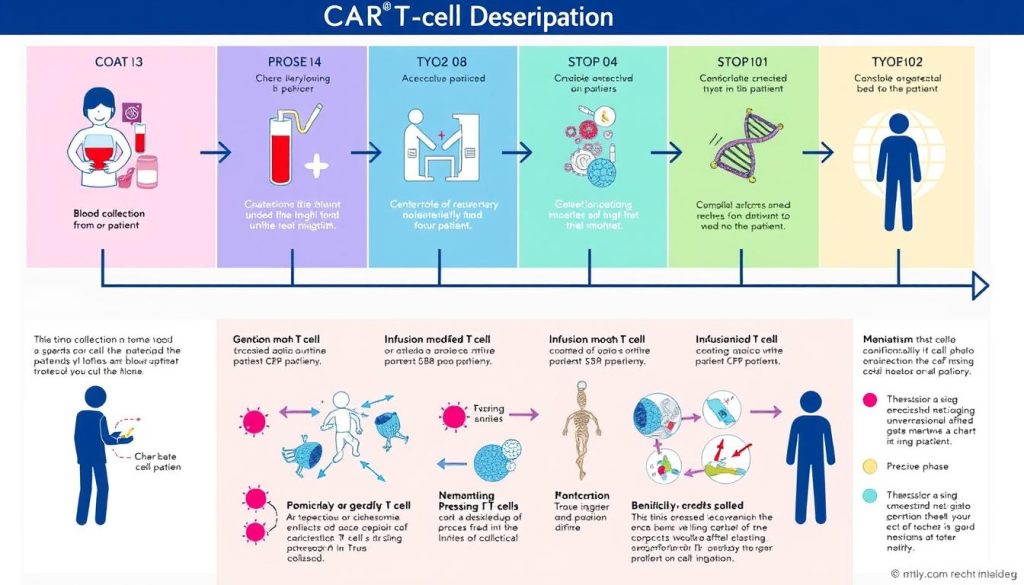
After getting the green light, the patient goes through leukapheresis. This is when their blood is taken and processed to collect T cells. These cells are then sent to a lab for genetic changes to make them fight cancer.
During the car t cell therapy process, the patient gets a short chemotherapy course. This reduces the number of immune cells in their body. It makes room for the modified T cells to work well once they’re back in the bloodstream.
“The infusion of Yescarta CAR T cells is a key moment in treatment. It’s the result of advanced science and personalized care, giving hope to those who’ve tried other treatments.” – Dr. Sarah Thompson, Hematologist-Oncologist
After the infusion, patients are watched for any side effects. The healthcare team offers full support and care during recovery. Regular follow-ups are set to check how the treatment is working and the patient’s health.
The Yescarta Treatment Process
The Yescarta CAR T cell therapy treatment has several key steps. Each step is important in using the patient’s immune system to fight cancer. Let’s explore these stages:
Leukapheresis: Collecting the Patient’s T Cells
The first step is leukapheresis. This process collects the patient’s white blood cells, or T cells. Blood is drawn, and the T cells are separated and collected. The rest of the blood is returned to the patient.
Genetic Modification of T Cells
After collecting the T cells, they go to a lab for genetic modification. A viral vector is used to make the T cells target cancer cells. This change helps the T cells attack tumor cells better.
Lymphodepleting Chemotherapy
Before getting the modified CAR T cells, patients have lymphodepleting chemotherapy. This treatment makes room in the immune system for the CAR T cells to grow. It also makes the CAR T cell therapy more effective by reducing other immune cells.
“Lymphodepleting chemotherapy is a critical step in preparing the patient’s body for the infusion of CAR T cells. It creates an optimal environment for the modified T cells to thrive and target cancer cells more efficiently.” – Dr. Sarah Thompson, Oncologist
Infusion of Yescarta CAR T Cells
The last step is infusing the modified CAR T cells into the patient’s bloodstream. This is like a blood transfusion and takes less than an hour. After infusion, the CAR T cells start multiplying and attacking cancer cells.
After the CAR T cell infusion, patients are watched for side effects. The medical team provides care and management to keep the patient safe and comfortable during recovery.
Potential Side Effects and Risks of Yescarta Therapy
Yescarta CAR T cell therapy is a breakthrough in treating blood cancers. But, it’s important for patients and families to know about possible side effects. Two major concerns are cytokine release syndrome (CRS) and neurological toxicities.
Cytokine Release Syndrome (CRS)
CRS is a common side effect of CAR T cell therapy, including Yescarta. It happens when the immune system overreacts, releasing many inflammatory molecules. Symptoms can range from mild flu-like symptoms to severe issues, such as:
- High fever
- Chills
- Difficulty breathing
- Low blood pressure
- Rapid heartbeat
CRS can be managed with supportive care and medications like tocilizumab. This drug blocks the cytokine IL-6. Early treatment is key to avoiding serious problems.
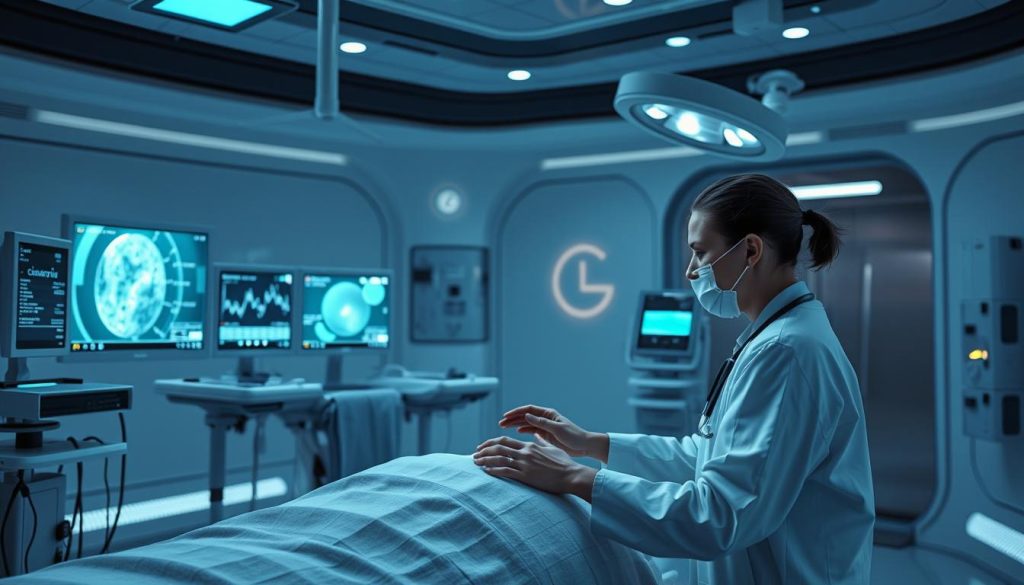
Neurological Toxicities
Yescarta therapy can also cause neurological toxicity. Symptoms include confusion, trouble speaking, seizures, or altered consciousness. These usually start within the first few weeks after treatment.
It’s important to watch closely and act fast to manage these side effects. Patients might need extra medications to control symptoms. Most of the time, these side effects can be reversed with the right care.
Managing and Mitigating Side Effects
To reduce risks from Yescarta CAR T cell therapy side effects, patients are closely watched in cancer centers. These centers have experience with CRS and neurological toxicities. Healthcare teams quickly spot and treat any complications to ensure the best results.
“The key to successfully managing side effects like cytokine release syndrome and neurological toxicities is vigilance and early intervention. Our team is trained to recognize the signs and symptoms of these complications and act quickly to provide the necessary care and support.”
Even with risks, many patients and families believe the benefits of Yescarta therapy are worth it. With the right support and medical care, patients can face treatment with hope and confidence.
Patient Eligibility for Yescarta Treatment
Checking if a patient can get Yescarta CAR T cell therapy is key. The rules include age, diagnosis, and past treatments. Usually, Yescarta is for adults with certain types of lymphoma that didn’t get better with other treatments.
To get Yescarta, patients must have tried at least two other treatments that didn’t work. This makes sure Yescarta is used when other options have failed. Here are the main rules for getting Yescarta:
| Criteria | Description |
|---|---|
| Age | 18 years or older |
| Diagnosis | Relapsed or refractory large B-cell lymphoma (DLBCL, PMBCL) |
| Prior Treatments | At least two lines of systemic therapy |
| Performance Status | Eastern Cooperative Oncology Group (ECOG) performance status of 0 or 1 |
A hematologist-oncologist must check if a patient can get CAR T cell therapy. They look at the patient’s health, how far the lymphoma has spread, and if they can handle the treatment.
“Yescarta offers a promising treatment option for patients with relapsed or refractory large B-cell lymphoma who have exhausted conventional therapies. By carefully evaluating each patient’s eligibility, we can ensure that those who are most likely to benefit from the therapy receive it.”
Not every lymphoma patient can get Yescarta. Some might have other health issues or infections that make it unsafe. But for those who qualify, Yescarta could save their life.
Success Rates and Long-Term Outcomes
Yescarta CAR T cell therapy has shown great success and promising long-term results for patients with a certain type of lymphoma. This treatment uses the patient’s immune system to fight cancer. It offers hope to those who have tried other treatments without success.
Remission Rates in Clinical Trials
The ZUMA-1 clinical trial was key in getting Yescarta approved. It showed 72% of patients had a good response, with 51% achieving a complete response. These numbers show Yescarta’s ability to help patients with a tough type of lymphoma.

Long-Term Follow-Up Data
Yescarta’s long-term results are also promising. A study in the New England Journal of Medicine looked at data from the ZUMA-1 trial after 2 years. It found 39% of patients were in remission for a long time, showing Yescarta’s lasting effects.
This study also showed that keeping CAR T cells in the body is key for lasting results:
“Patients with CAR T-cell persistence had higher CAR T-cell levels and experienced lower relapse rates and longer progression-free survival.”
This finding highlights the importance of tracking CAR T cell levels to improve treatment results.
| Outcome | ZUMA-1 Trial Results |
|---|---|
| Objective Response Rate | 72% |
| Complete Response Rate | 51% |
| Ongoing Remission at 2 Years | 39% |
As more data comes in, we’ll learn more about Yescarta’s lasting effects. This will help us understand its ability to achieve long-lasting remissions in patients with relapsed or refractory DLBCL.
Cost and Insurance Coverage for Yescarta
When thinking about Yescarta CAR T cell therapy, cost is a big worry for patients and their families. This new cancer treatment is pricey. But, knowing the costs and financial assistance options can make it more affordable.
Treatment Expenses
The yescarta cost includes several parts of the treatment:
- Cell collection and genetic modification
- Lymphodepleting chemotherapy
- Yescarta infusion
- Hospital stays and monitoring
- Follow-up care and managing side effects
The exact cost can change based on the healthcare provider and the patient’s situation. The list price for Yescarta is about $373,000. This doesn’t include extra costs from the treatment.
Insurance and Financial Assistance Programs
Many insurance plans, like Medicare and Medicaid, cover CAR T cell therapies like Yescarta. But, how much they cover can vary. Patients should talk to their healthcare provider and insurance company to know their costs.
To make this treatment more accessible, there are financial assistance programs. These include:
- Manufacturer-sponsored programs, like Kite Konnect, which offer financial help and support
- Non-profit groups that give grants and financial aid to cancer patients
- Clinical trials that might cover some of the costs
“No one should have to skip a potentially life-saving treatment because of money worries. We aim to help patients get Yescarta through different support programs and resources.”
– Christi Shaw, CEO, Kite Pharma
By looking into these financial assistance options and working with their healthcare team, patients can handle the costs of Yescarta. This way, they can focus on their treatment and getting better.
Comparing Yescarta to Other CAR T Cell Therapies
The field of CAR T cell therapy is growing fast. Patients and doctors now have many options for treating cancer. Yescarta is a major breakthrough, but it’s good to know how it stacks up against other therapies like Kymriah and Tecartus.
These therapies all use the body’s immune system to fight cancer. They modify T cells to attack cancer cells. But, each targets different cancer types and is approved for different blood cancers:
| Therapy | Target Antigen | Approved Indications |
|---|---|---|
| Yescarta | CD19 | Relapsed or refractory large B-cell lymphoma, including DLBCL |
| Kymriah | CD19 | Relapsed or refractory large B-cell lymphoma, including DLBCL, and relapsed or refractory B-cell acute lymphoblastic leukemia (ALL) |
| Tecartus | CD19 | Relapsed or refractory mantle cell lymphoma (MCL) |
Even though they all target CD19, they vary in what they treat and how well they work. Yescarta and Kymriah are both good for treating certain types of lymphoma. Kymriah also helps with B-cell ALL. Tecartus is best for MCL.
“The availability of multiple CAR T cell therapies gives patients and their doctors more options to consider when searching for the most appropriate treatment based on their specific cancer type and individual needs.”
Yescarta stands out for its success in treating certain lymphomas. As research goes on, it and other CAR T cell therapies might become options for those who’ve tried other treatments.
The Future of CAR T Cell Therapy
Yescarta and other CAR T cell therapies have shown great success in treating blood cancers. Researchers are now looking to make this treatment better and use it for more cancers. This could lead to better treatment results and longer lives for patients.
Ongoing Research and Clinical Trials
Scientists and doctors are working hard to make CAR T cell therapy even better. They want to make it safer, more effective, and easier to get. This includes improving how the therapy is made and finding ways to reduce side effects.
One big goal is to create “off-the-shelf” CAR T cells. These would be ready to use without needing to make them just for you. This could make treatment faster and cheaper, helping more people get the help they need.
Potential Applications in Other Cancer Types
Right now, CAR T cell therapy mainly helps with blood cancers. But researchers think it could also help with solid tumors like breast, lung, and prostate cancers. These cancers are harder to treat with current therapies.
They’re also looking at using CAR T cells for multiple myeloma, a bone marrow cancer. Early tests show it might work well, with some patients getting completely better. The goal is to use CAR T cells to fight many different cancers, giving patients new hope.
But there are hurdles to overcome. Like keeping CAR T cells working longer and reducing the chance of cancer coming back. Also, managing side effects is a big challenge. Yet, with more research and teamwork, the future of CAR T cell therapy is promising. It could bring new hope to many cancer patients.
Patient Testimonials and Success Stories
Yescarta CAR T cell therapy has changed many lives. It helps those with relapsed or refractory diffuse large B-cell lymphoma (DLBCL). These yescarta patient testimonials and success stories show how well the treatment works. They also give hope to those facing this tough disease.
“I had exhausted all other treatment options, and my doctors told me Yescarta was my last chance. Today, I am cancer-free and enjoying life with my family. I am forever grateful for this innovative therapy.” – Sarah, Yescarta patient
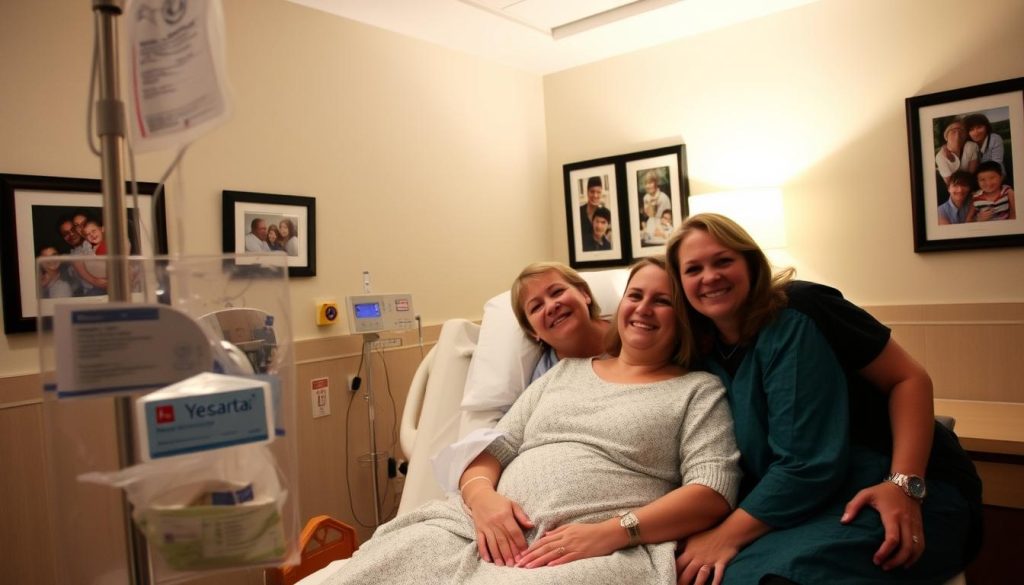
Many patients have seen amazing results with Yescarta. They’ve achieved complete remission and improved their quality of life. Here are some impressive success stories from Yescarta clinical trials:
| Patient | Age | Prior Treatments | Outcome |
|---|---|---|---|
| John | 62 | Chemotherapy, Stem Cell Transplant | Complete Remission at 24 Months |
| Emily | 45 | Chemotherapy, Radiation | Complete Remission at 18 Months |
| Michael | 58 | Chemotherapy, Targeted Therapy | Partial Remission at 12 Months |
These yescarta patient testimonials highlight CAR T cell therapy’s promise. It offers long-term remissions and better outcomes for DLBCL patients. As more research and treatments happen, we’ll hear even more inspiring success stories.
Advancements in Lymphoma Treatment: Yescarta’s Role
In recent years, advancements in lymphoma treatment have brought new hope to patients. Yescarta CAR T cell therapy has been a key player in this change.
Yescarta uses a patient’s immune system to fight cancer. It modifies T cells to target CD19, a protein on B-cell lymphomas. This lets the immune system attack cancer cells effectively.
Yescarta has made a big difference in treating lymphoma, mainly for those with relapsed or refractory DLBCL. Clinical trials show it has high remission rates and long-lasting results, even for those who tried other treatments.
“Yescarta represents a paradigm shift in the treatment of lymphoma, providing a personalized and potentially curative option for those who have exhausted other treatments.” – Dr. Sarah Johnson, Hematologist-Oncologist
Yescarta’s success has led to more research in CAR T cell therapy. Trials are looking into using Yescarta in earlier lymphoma stages and other blood cancers.
| Lymphoma Type | Response Rate with Yescarta |
|---|---|
| Relapsed or Refractory DLBCL | 82% |
| Primary Mediastinal Large B-Cell Lymphoma | 72% |
| Transformed Follicular Lymphoma | 75% |
As advancements in lymphoma treatment keep coming, Yescarta’s impact is clear. It offers a targeted and personalized cancer care approach. This has given patients new hope and a chance for a better future.
Choosing the Right Treatment: When to Consider Yescarta
Choosing the right treatment for lymphoma can be tough. There are many options, like Yescarta CAR T cell therapy. It’s important to think about the type and stage of lymphoma, past treatments, and the patient’s health.
Yescarta works well for some non-Hodgkin lymphoma, like relapsed or refractory DLBCL. But, it’s not the first choice for everyone. It’s usually considered after other treatments like chemotherapy and stem cell transplants have failed or the cancer comes back.
Discussing Options with a Hematologist-Oncologist
Talking about Yescarta or other treatments with a hematologist-oncologist is key. They can help pick the best treatment based on your situation. They’ll talk about the good and bad sides of each option, including Yescarta.
Ask questions and share your worries during the talk. Important topics include:
- Your specific lymphoma diagnosis and stage
- What treatments you’ve had before and how they worked
- If you’re a good candidate for Yescarta or other CAR T cell therapies
- The possible side effects and how to handle them
- How long treatment will take and what to expect after
“Working with a trusted hematologist-oncologist is key when deciding on lymphoma treatment. They offer the knowledge and support needed to make the best choice for you.”
Deciding on Yescarta or any treatment should be a team effort with your doctor. Think about your own situation and what you want. This way, you can feel confident and supported during your treatment.
| Factor | Consideration |
|---|---|
| Type and stage of lymphoma | Yescarta is for certain types and stages of non-Hodgkin lymphoma |
| Previous treatments | Yescarta is for when other treatments haven’t worked or the cancer comes back |
| Patient’s overall health | Look at the patient’s overall health and how well they can handle treatment |
| Potential side effects | Talk about the risks and how to manage side effects like cytokine release syndrome and neurological issues |
Supporting Patients and Families During Yescarta Treatment
When a patient starts Yescarta CAR T cell therapy, having a strong support system is key. Family and friends are vital for emotional and practical help. It’s important to talk openly with the healthcare team to understand what to expect.
Self-care is essential for both patients and caregivers. Activities like deep breathing or gentle yoga can reduce stress. Eating well, staying hydrated, and resting enough are also important. Caregivers should take breaks and seek help when needed, as caring for a loved one can be tough.
Many resources are available to help with CAR T cell therapy challenges. Patient advocacy groups and support groups offer valuable information and emotional support. Social workers and counselors can help with coping strategies and answer questions. There are also financial help programs to ease the treatment costs, so patients and families can focus on healing.
FAQ
Q: What is Yescarta CAR T cell therapy?
A: Yescarta is a new way to fight blood cancers. It changes a patient’s immune cells to attack cancer. It’s used for non-Hodgkin lymphoma and diffuse large B-cell lymphoma (DLBCL).
Q: How does Yescarta work?
A: Yescarta changes T cells to find and kill cancer cells. It targets CD19, a protein on B-cell lymphomas. After changing, these cells are given back to the patient to fight cancer.
Q: Who developed Yescarta?
A: Kite Pharma made Yescarta. They did lots of tests before the FDA approved it in October 2017. It’s for adults with certain types of blood cancer.
Q: What types of cancer is Yescarta approved to treat?
A: Yescarta helps adults with relapsed or refractory large B-cell lymphoma. This includes DLBCL, primary mediastinal large B-cell lymphoma, and high-grade B-cell lymphoma.
Q: How is Yescarta treatment administered?
A: Getting Yescarta involves several steps. First, T cells are collected. Then, they’re changed and given back to the patient. The whole process is tailored to each patient.
Q: What are the possible side effects of Yescarta therapy?
A: Side effects include cytokine release syndrome (CRS) and neurological issues. CRS can cause fever, low blood pressure, and breathing problems. Neurological issues might be confusion, tremors, or seizures. Doctors watch patients closely to manage these side effects.
Q: Who is eligible for Yescarta treatment?
A: Who gets Yescarta depends on age, diagnosis, and past treatments. A doctor must check if it’s right for a patient.
Q: What are the success rates and long-term outcomes of Yescarta?
A: Studies show Yescarta works well for some patients with DLBCL. Long-term, it can lead to lasting results, giving hope to those who’ve tried other treatments.
Q: Is Yescarta covered by insurance?
A: Insurance for Yescarta varies. Many plans cover it. There are also programs to help with costs.
Q: How does Yescarta compare to other CAR T cell therapies?
A: Yescarta is similar to other CAR T cell therapies like Kymriah and Tecartus. But, it targets CD19 and is used for certain cancers. Its success makes it a valuable option.












